Hunt’s 48 Limitless UD wheelset takes the platform of Hunt’s top-of-the-range aero ‘Limitless’ wheelsets and integrates carbon spokes into the mix.
The spokes are said to improve lateral rigidity, while saving weight versus the equivalent steel-spoked 48 Limitless wheelset.
On paper, the inclusion of carbon spokes should yield tangible improvements in performance when it comes to responsiveness and acceleration.
The wheelset also includes Hunt’s latest Limitless Aerodynamicist rim profile.
While I’m not sure the difference is night and day compared to cheaper wheels from Hunt’s stable, the Hunt 48 Limitless UD is a seriously quick performance wheelset.
Hunt 48 Limitless UD Carbon Spoke Disc wheelset details and specifications
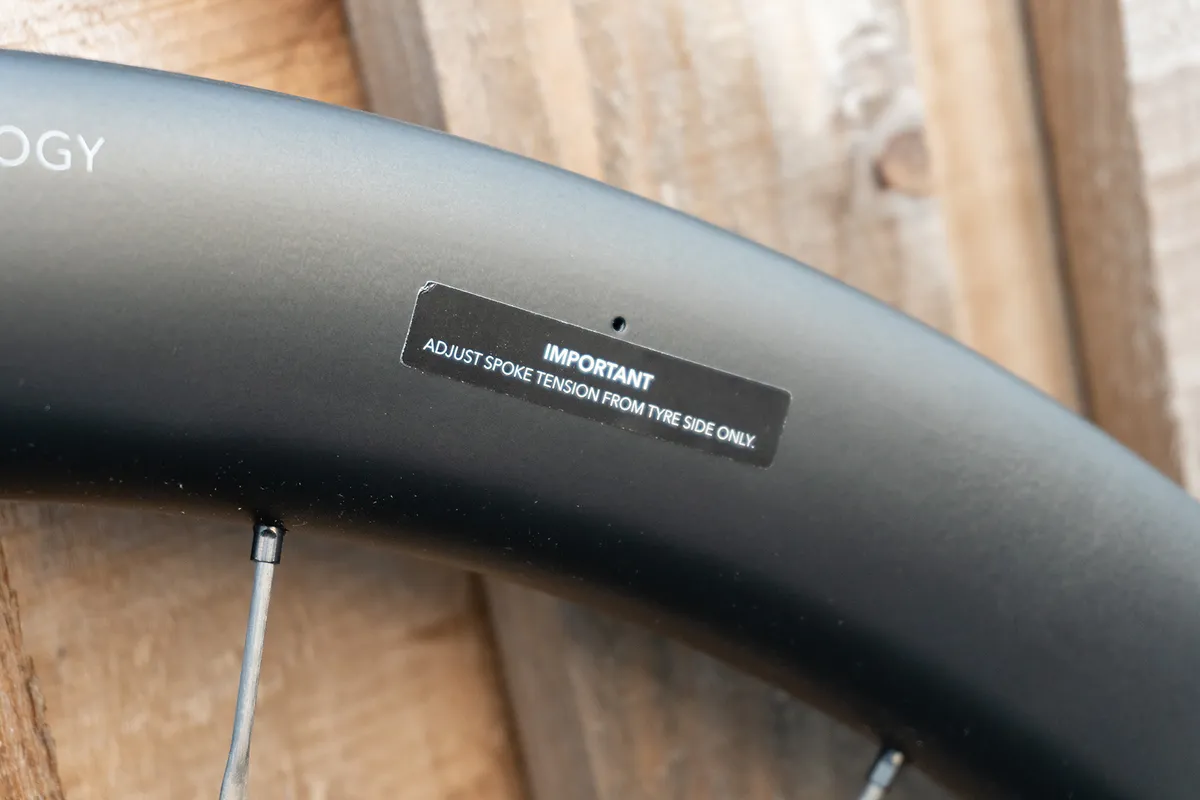
The Limitless UD Carbon Spoke Disc wheelset is available with 48- or 60mm-deep rims.
The 48 version on test here tips my scales of truth at 1,548g (711g front, 837g rear), plus 5g apiece for the supplied tubeless valves.
That’s 47g more than Hunt claims in total, but my figure also includes tubeless rim tape.
For context, a £1,500 Roval Rapide CL II wheelset is claimed to weigh 1,590g all-in, but with slightly deeper rims.
The centrepiece of this wheelset is the unidirectional carbon spokes. These are the source of the claimed 107g weight savings versus the standard 48 Limitless wheelset (which weighs a claimed 1,618g).
Hunt says the spokes also increase the wheelset’s rigidity. It points to its own tests, which show a six per cent reduction in deflection versus the use of its steel spokes in a 44 Aerodynamicist wheelset as evidence, despite the loss of four spokes in the lacing pattern.
In the case of the 48 Limitless UD Carbon Spoke Disc wheelset, Hunt claims up to a 30 per cent increase in “lateral responsiveness” compared to the otherwise identical steel-spoked version.
In short, it should be more efficient at accelerating.
On top of this, Hunt reckons the innate properties of carbon used here should lead to improved high-frequency vibration absorption.
These spokes are ‘attached’ via an alloy mandrel at the rim and a steel mandrel at the hub – Hunt calls this ‘Taperlock’ technology.
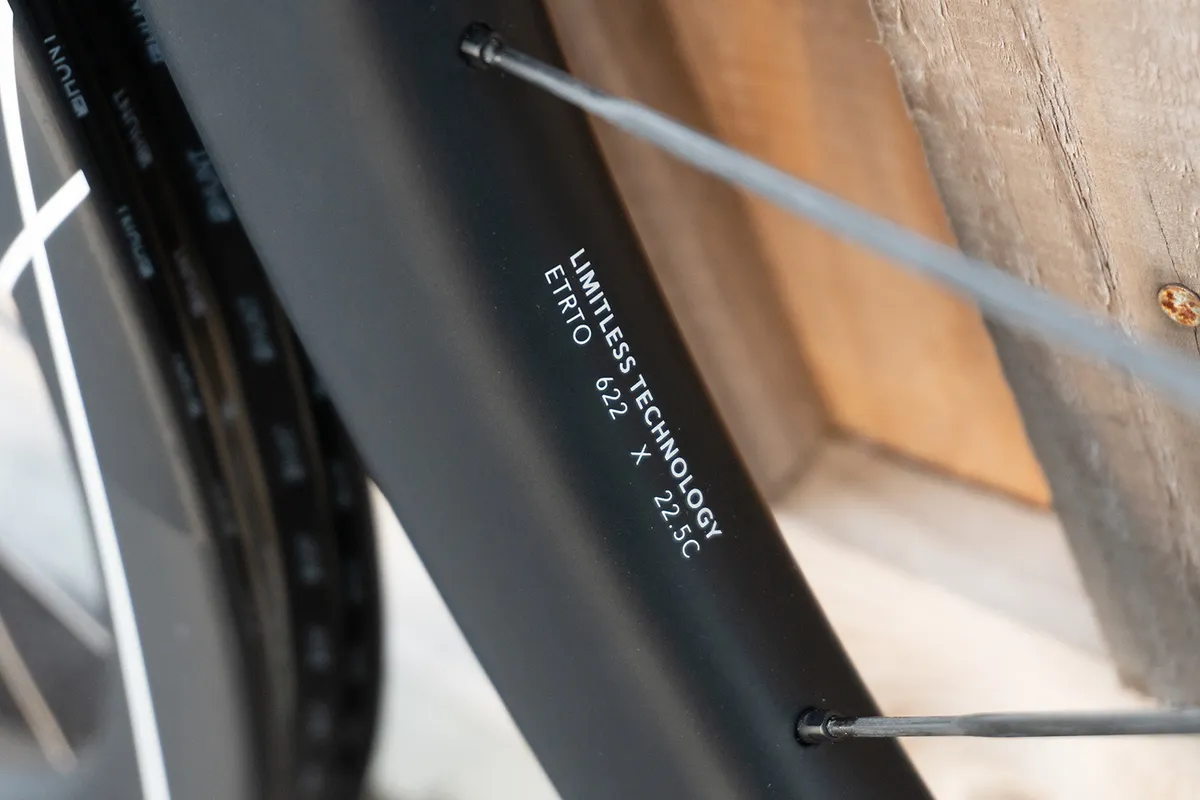
You can think of these mandrels as a kind of lug for wheels, except here the rim end is threaded. The spokes can be trued by adjusting nuts accessible through spoke holes on the rim bed.
The visible nipple is instead there to hold the spoke’s orientation while being trued.
This does, as you may have guessed, mean the spokes are proprietary to Hunt. You’ll therefore need to source spares directly from the brand, in the event you need any, because your local bike shop won’t carry them.
The rim features a broad U-shaped profile, measuring 22.5mm-wide internally and 35mm-wide externally.
The rim bed features a narrow but pronounced shoulder, with a wide internal arc to maximise air volume.
The rims are hooked (as opposed to hookless), offering compatibility for both tubeless and clincher setups.
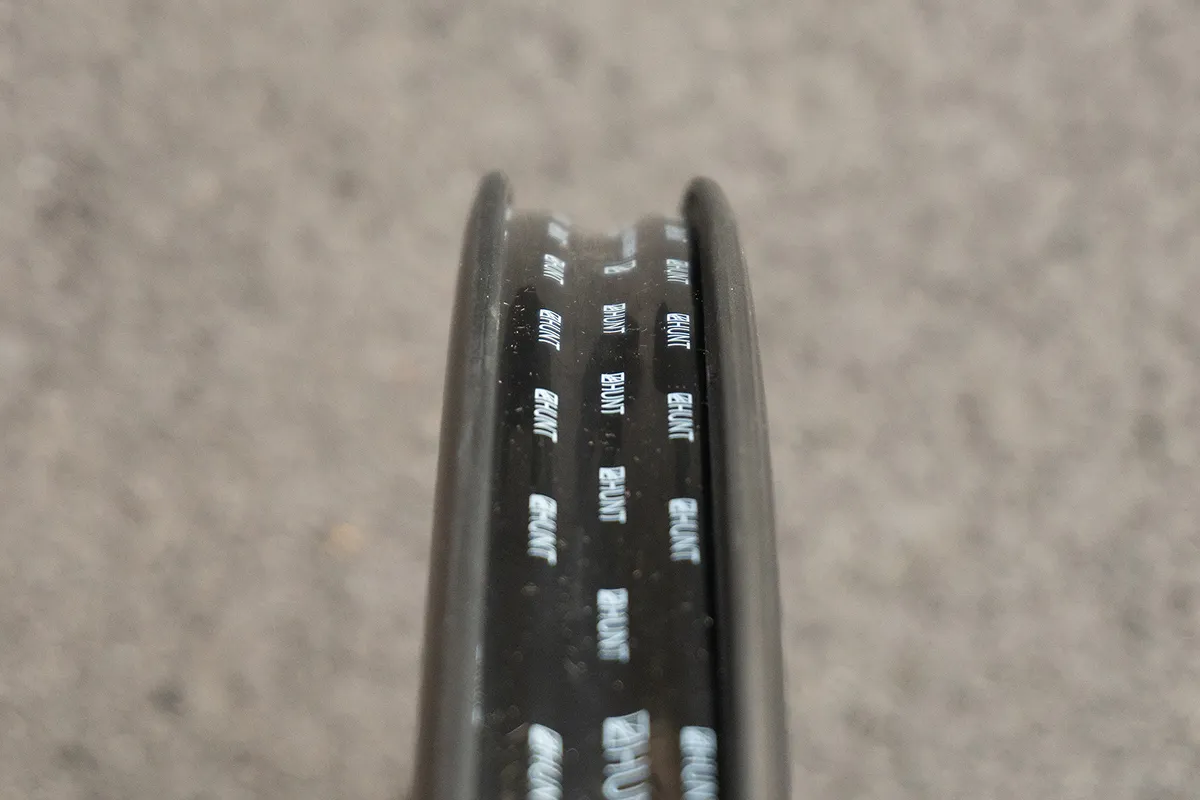
Hunt says the rims are aerodynamically optimised for 700 x 28c tyres. This follows the current trend of having a slightly wider external rim width versus the widest extremity of the tyre as the most aerodynamically efficient way to go.
The 48mm rim depth is said to produce a more stable and nimble ride in a wider range of conditions, versus the 60mm-deep option, which are designed to excel at pure aero performance on flatter terrain and calmer days (with slightly narrower rim widths to boot).
The hubs are Hunt’s Sprint SLC models, made from cold-forged 7075-T6 aluminium alloy. It says this specification of alloy (as opposed to, for example, 6061 series) produces a better stiffness-to-weight ratio.
The freehub sees a 48-point ratchet layout, engaging at 7.5-degree intervals. Each pawl is also stepped to help distribute forces under high torque.
Hunt says it has done away with its traditional loud freehub noise, by smoothing out the trailing edge profile on the pawls.
This was the major negative Warren Rossiter found when testing the 60 Limitless Aero Disc wheelset, which featured the previous design.
The hubs spin on stainless steel EZO bearings (tested here), although for a princely extra £350 you can opt for CeramicSpeed ceramic bearings instead.
Hunt also provides its own lockrings for the 48 Limitless UD wheelset, weighing 19g a pair (using Shimano's Center Lock external standard). By comparison, Shimano’s own Center Lock lockrings supplied with my 105 R7100 Di2 groupset weigh 33g a pair.
I don’t own the tool for Shimano's external standard (one isn’t provided in the box, and my toolbox is pitifully small), so I stuck with the standard lockrings instead.
Hunt 48 Limitless UD Carbon Spoke Disc wheelset performance
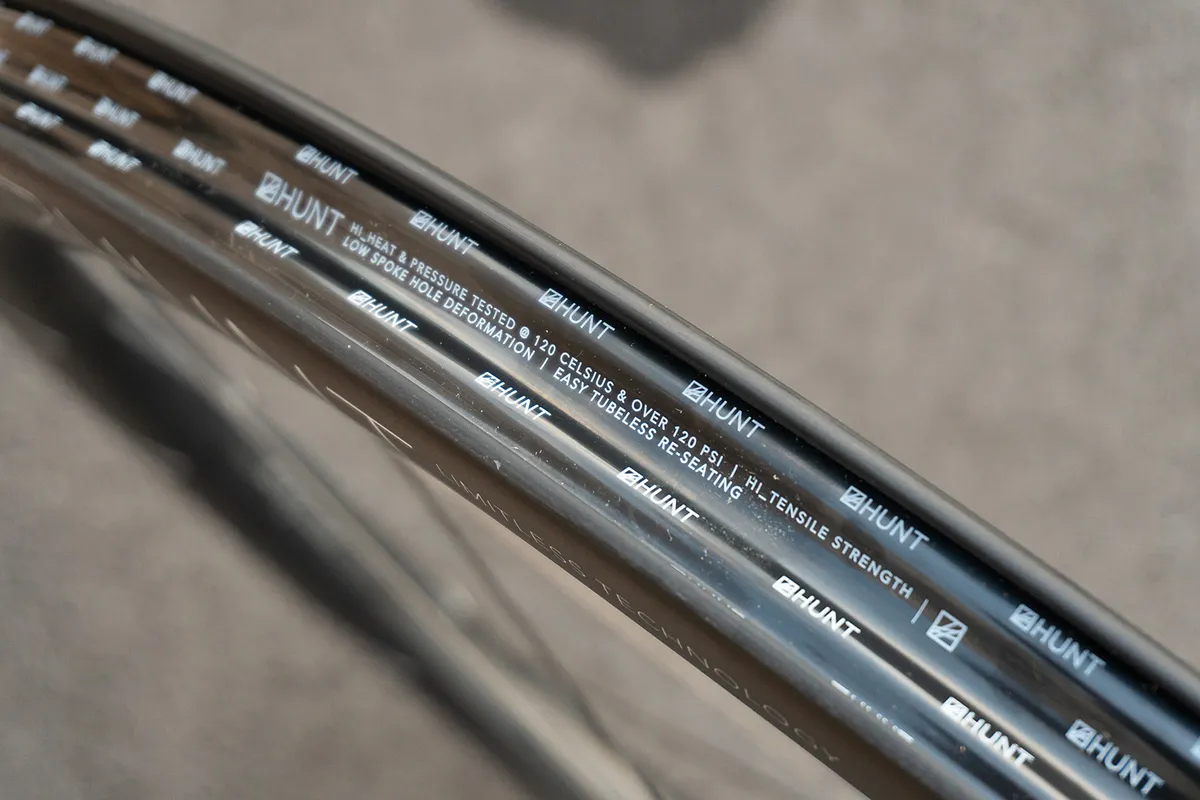
There’s no doubt about it, the 48 Limitless UD wheelset is fast, pretty much wherever you choose to ride it.
On the flat, the 48mm depth feels a good step more efficient at higher speeds than the wheelset I'd just removed – Reynolds’ ATRx, which features a 40mm-deep rim.
These two wheelsets aren’t really direct competitors (the ATRx is an all-road style wheel, albeit priced similarly), but it demonstrates the benefits of a deeper rim.
You can go deeper with this line of Hunt wheels at 60mm if you want, of course. However, I would argue that unless you ride in an almost windless environment, or have a particularly strong ability to handle deep rims in blowy conditions, the 48s are probably the most efficient of the two, for most riders.
In crosswinds and generally blowy conditions, the 48s stand firm impressively.
Like any wheelset, strong gusts can divert you from your chosen line when the wind gods throw a tantrum, but correcting it feels more of a gentle lean towards the wind than a sudden twitch of the handlebars.
This means the 48 Limitless UDs are easy to ride for long distances, not requiring you to be overly attentive when conditions are challenging. In fact, I’m confident they’re among the most stable wheels I’ve ever ridden featuring this depth.
Some of this will be down to the wide U-shape of the rim, facilitated by the broad 35mm external width.
The 22.5mm internal width also enables tyres to blow out generously.
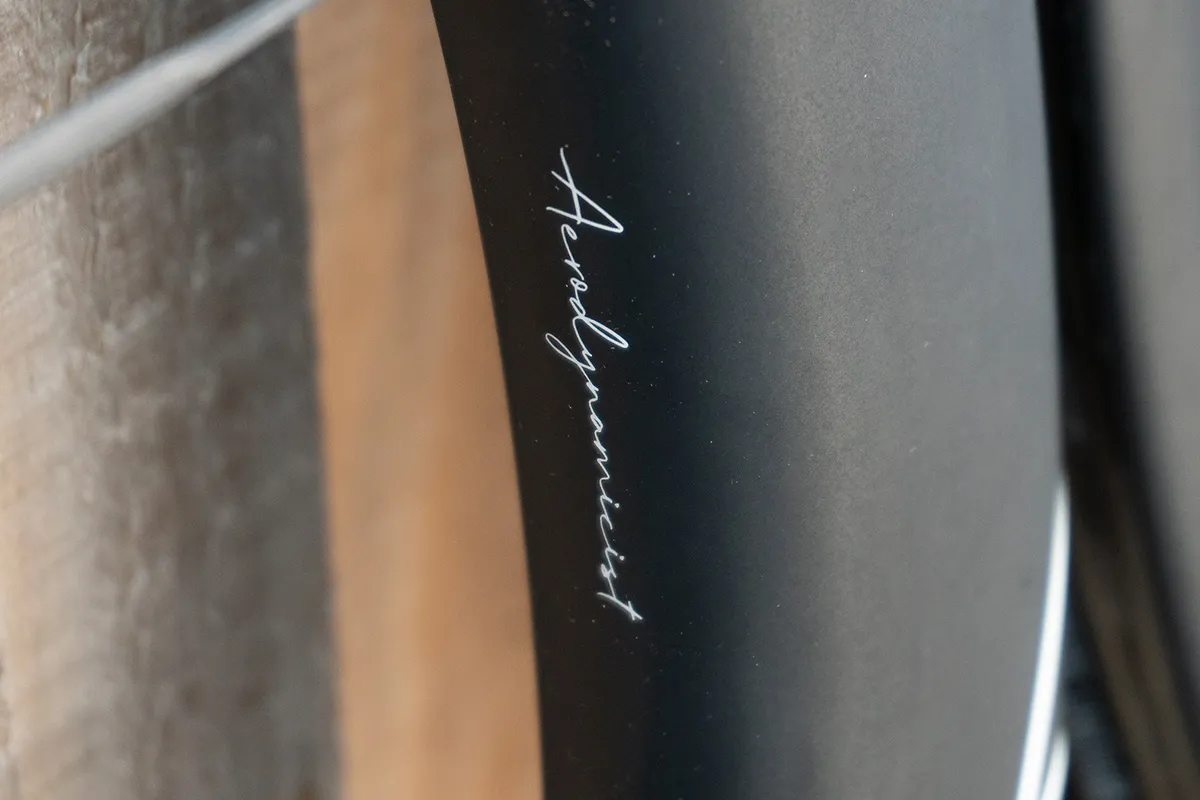
I opted for my currently favoured 700 x 28c Pirelli Race 4S clincher tyre for the majority of testing, measuring out to nigh-on 30mm wide when inflated to 75psi / 5.2 bar.
A 28c Continental GP5000 S TR – set up tubeless – measured similarly at 70psi / 4.8 bar. In both cases, the external rim was slightly visible around the extremity of the tyres.
I got a good tubeless seal first time (without sealant), only experiencing the slightest difficulty in getting the last part of the tyre over the rear rim.
Whichever way you choose to run your tyres, the added width maximises the nominal size of the tyre, producing a more comfortable ride (provided you adapt your tyre pressures to suit the larger volume).
This also noticeably improved my descending confidence and speed. Compound grip and tyre suppleness naturally play a fundamental role here, but the 48 Limitless UD wheelset reacts quickly to inputs, and carves lines inspiringly well.
As mentioned earlier, Hunt claims the carbon spokes reduce high-frequency road buzz. I couldn’t really detect that in action, though the comfort benefits of the increased tyre volume are clear.
However, what the carbon spokes do provide is buckets of lateral rigidity.
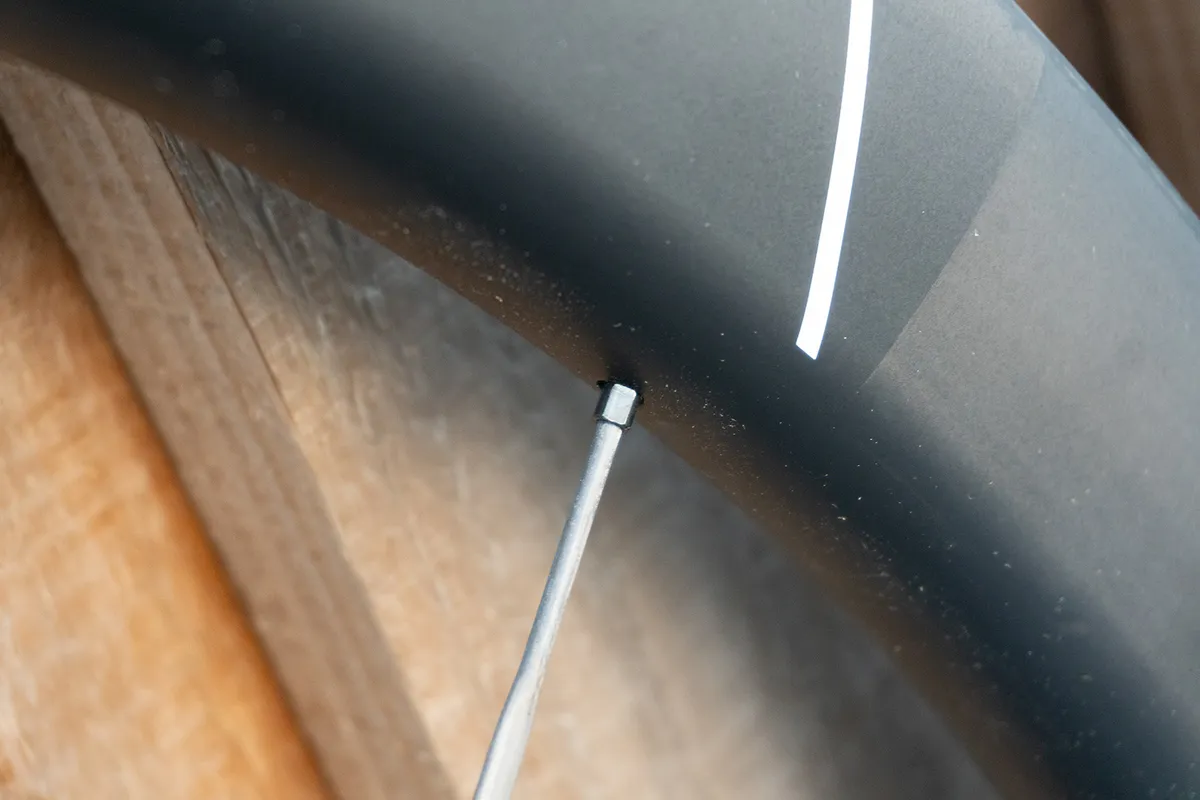
Get out of the saddle and sprint, and the wheels hardly flex at all. When I attacked steep rises in the road, it felt as if I simply rocketed forwards.
Climbing seated, you get the upsides of a light-ish wheelset, plus the aero-optimised profile.
The weight saving over standard steel spokes will also help somewhat with overcoming moments of low inertia – I found the 48 Limitless UDs to be particularly effective when putting an effort in so that I accelerated on a rise, before enjoying the momentum over the crest.
The increased rigidity is obvious whether you’re sprinting at higher speeds, or getting out of the saddle for a period of time on a climb.
As a point of comparison, I’ve recently ridden the 1,266g DT Swiss 1100 PRC Dicut Mon Chasseral wheelset aboard a Canyon Ultimate CFR.
Those are just about the most climbing-oriented wheels I’ve ever ridden, but although the 48 Limitless UD wheelset is understandably portly in comparison, it’s a trade-off well worth making, unless weight is your only concern.
I’ve also ridden a few different sets of Hunt wheels in recent years, including the great bang-for-buck 54 Aerodynamicist Carbon Disc wheelset. None have had carbon spokes, and none have felt as stiff or responsive as these.
Whether this translates into tangible gains against the clock is debatable, but how a wheelset feels to ride is also crucial.
I’ve had no reliability issues with the carbon spokes during testing, either
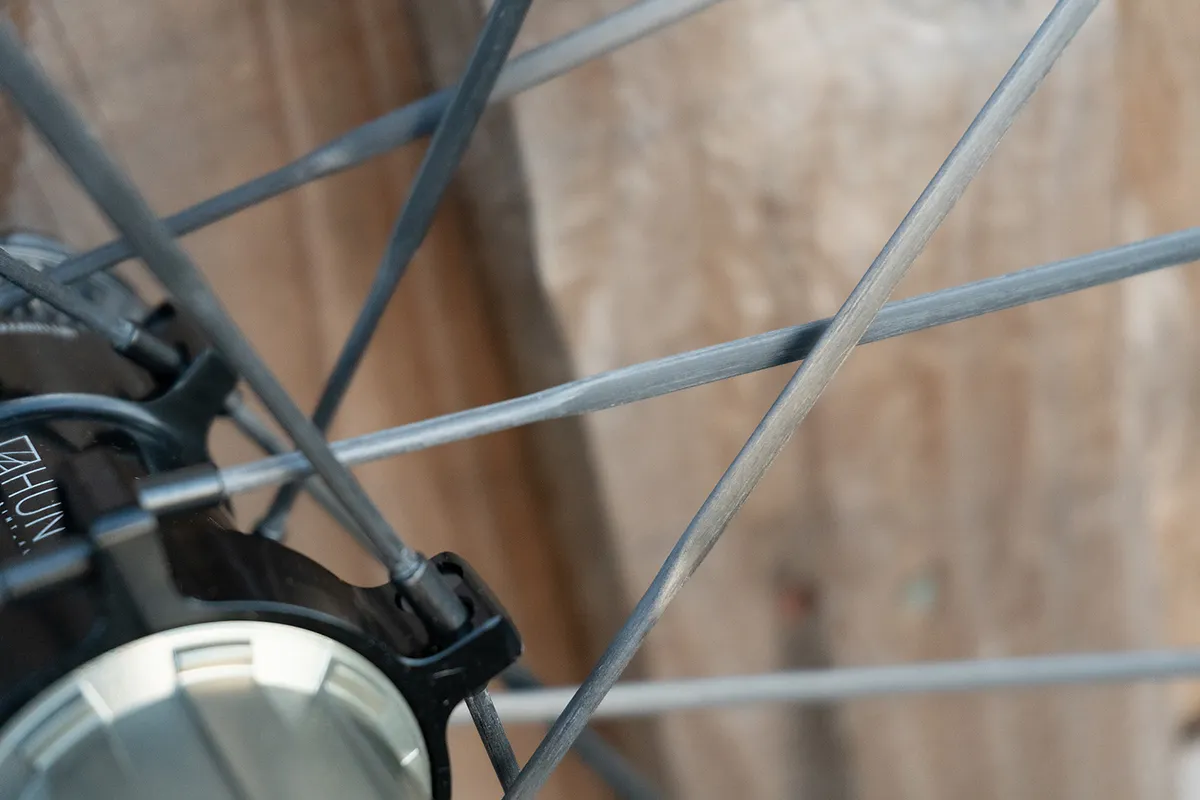
They don’t creak or rattle (a legend I’ve heard about carbon spokes on more than one occasion over the years), have stayed tight and kept the rims true to the naked eye.
Meanwhile, Hunt will service them for free within the three-year warranty it provides.
This is especially important, because although Hunt says competent bike shop mechanics should be able to true the wheels, it recommends they should be returned to its own mechanics for the work.
The wheelset is also covered by its lifetime crash-replacement policy.
It all sounds quite rosy. But I must concede, if I switched over to the 54 Aerodynamicist wheelset, I don’t think I would feel I’d taken a significant backwards step in performance.
Yes, the carbon-spoked wheels feel faster and stiffer (and they’re marginally lighter), but do they fundamentally transform the overall experience of a ride?
I’m not convinced, especially for a £300 additional outlay versus the standard steel-spoked 48 Limitless wheelset (with the 54 Aerodynamicists a full £500 cheaper).
Whether the cost-benefit ratio is worth it to you will depend on the kind of performance you’re looking for.
Want the best of the best (from Hunt, at least)? This is where you probably want to be looking. Want the absolute best-value performance deal Hunt can offer? That’s harder to justify here.
Elsewhere, the hubs feel smooth and efficient, taking a satisfyingly long time to spin down when wound up on a service stand.
The optional ceramic bearings may spin for longer in that scenario, but it’s up to you whether a small wattage saving and purported reliability improvement is really worth a £350 price hike.
Personally, in a world where financial pressures are increasing steadily, I’d prefer to save my cash.
In any case, I’m a fan of the recently quietened freehub design. It’s by no means silent, but it makes freewheeling less of an embarrassment (or a public declaration of how little work you’re really doing).
Hunt 48 Limitless UD Carbon Spoke Disc wheelset bottom line
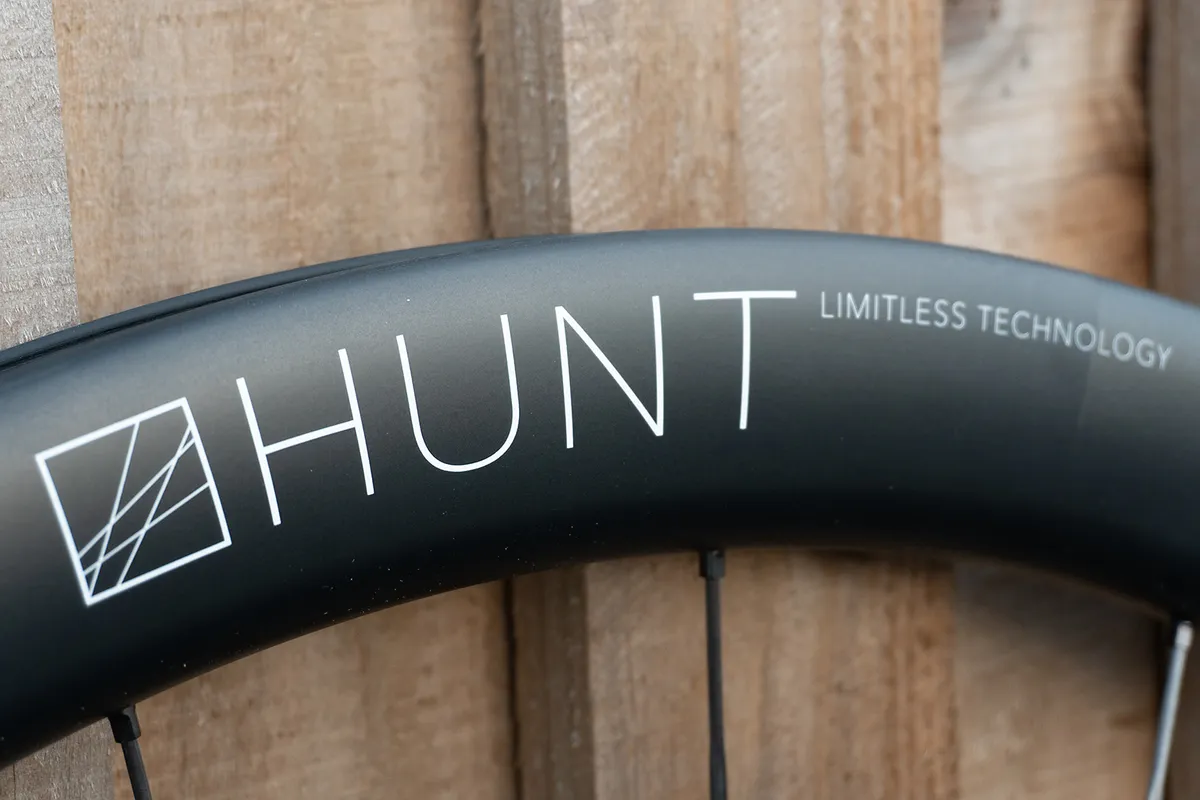
Fast, stiff, wide, light… The Hunt 48 Limitless UD Carbon Spoke Disc wheelset bundles much of Hunt’s latest design thinking into one wheelset, and it delivers on almost every level.
Some speed merchants may see the 60mm-deep models as more attuned to their go-fastest needs. However, I’m convinced 48mm is deep enough for practically everything, and is arguably more versatile than the 60s, which may be too focused for many.
The carbon spokes add impressive rigidity, which translates into a little more reactiveness and an overall feeling of increased speed in certain scenarios versus standard steel spokes.
That said, ride quality is on a par with other Hunt wheels I’ve ridden with similar depth and width dimensions, and I question whether the carbon spokes are really worth the added cost.
However, if you want the fastest, raciest wheels Hunt can currently produce, then look no further.
Product
| Brand | Hunt_bike_wheels |
| Price | €1889.00, £1449.00, $1669.00 |
| Weight | 1558g |
Features
| Rim material | carbon |
| Wheel size | 29in_700c |
| Brake type simple | disc |
| Spokes | UD Carbon, Taperlock |
| Freehub | Shimano |
| Rim depth | 48mm |
| Rim internal width | 22.5 |
| Features | Width: 35mm external Axle: 12x142mm thru-axle |
| Spoke count | 20 |
| Spoke count | 18 |

